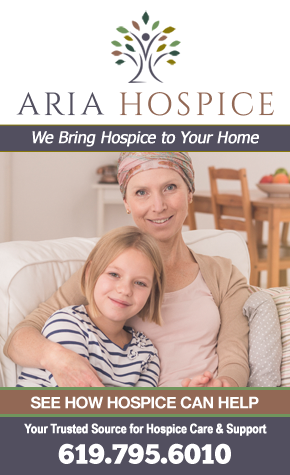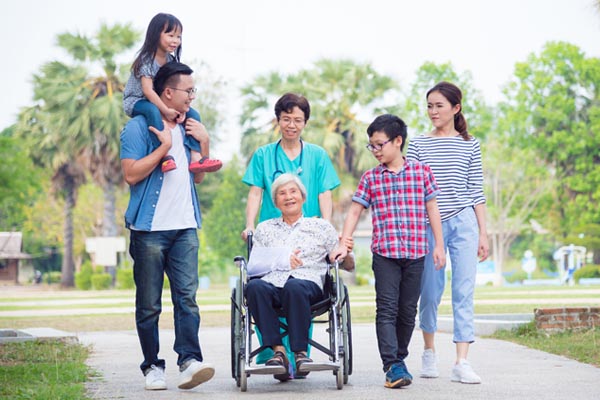“They treated my family member with a lot of love.”
![]()
Compassionate Hospice Care Serving San Diego County and El Centro
“They treated my family member with a lot of love.”
![]()
“Finally someone who understands and listens to a family’s needs and concerns. Thank you for your light when my family was in darkness.”
![]()
“I just want to say to Imperial County that Aria Hospice cared for my uncle and grandpa for all their needs. They were always on time and were very responsive. I can’t thank the nurses enough for the care provided and the office staff for always accomplishing our needs – thank you very much.”
![]()
“I would strongly recommend this place. They help me all the way and are very responsible for what they do. Always provided what we need and always in time they know what to do thank god you guys exist keep all I he good work a special thanks to Josephina she definitely understands and knows what we need – thank you so much may god bless you always.”
![]()

Very often when we hear the word “hospice” it comes as a shock for many people. People immediately assume a person is actively “dying.” One day we all will come face-to-face with our own mortality. Hospice is a philosophy of care focused on comfort, quality of life, and assisting those nearing the end of life. Hospice celebrates life and supports the individual needs of the patient and loved ones.
After receiving a diagnosis of a limited life expectancy, patients make an important choice be-tween hospice care and aggressive medical treatment. When a cure is no longer possible and comfort care is desired, hospice can help support the patient and her loved ones in improving quality of life and assisting in meeting end-of-life goals.

Aria Hospice care neither prolongs life nor hastens death but relieves pain and physical discomfort so that the patient can better fulfill their emotional and spiritual wishes.
Many people mistakenly believe that hospice patients are bed-bound, critically ill, and unable to continue living life to the fullest. Hospice is often misunderstood and looked upon as a type of care that is provided only during the last few days of life. This is unfortunate for the patient and the family members, because without hospice, or waiting too long before coming into hospice, there is the potential to deny a person the opportunity for enhanced comfort, improved quality of life and the ability to come to a peaceful closure with the people that surround us.
Individuals are eligible for hospice care if they have a life expectancy of six months or less. Knowing what options regarding healthcare are available, will allow you to determine when you or your loved one qualifies for hospice care. Examples of signs that may indicate a person is eligible for hospice care are:
Hospice originally dates to medieval times when it was a place where weary travelers could find shelter and temporary respite from their journeys. Religious groups operated these shelters for travelers on religious pilgrimages but as time passed, they began to care for the sick, hungry, and weary. The word hospice comes from the Latin word “hospices” meaning host and “hospitium” meaning hospitality.
The modern hospice can be traced to the Irish Sisters of Charity who established St. Joseph’s Hospice in London in 1905. However, the modern concept of hospice care as we know it today was pioneered and defined, in large part by Dame Cicely Saunders, a British physician who opened St. Christopher’s Hospice in London in 1967. It was through her work that the philosophy of emphasizing pain and management control rather than curative care was established.
In the United States, the hospice movement started later than it did in England and was enhanced by the work of Elisabeth Kubler-Ross who wrote On Death and Dying in 1969. Through the efforts of many professional and laypersons, the hospice movement continued to advance, and the first United States hospice program began in New Haven, Connecticut in 1974.
Hospice continued to flourish in the United States and across the country. These programs were primarily volunteer or non-profit based and the vast majority were home care programs. In 1982, Congress passed the Medicare Hospice Benefit, which expanded hospice care availability for the Medicare eligible population. This first attempt at legislation contained a “sunset clause,” however, in 1986 this clause was removed, and hospice care became a permanent Medicare benefit. The legislation included a definition of “home” as “wherever the patient lives” resulting in the ability to provide care in Skilled Nursing Facilities and in most states, Assisted Living Facilities. Also, at this time, states were given the option of providing hospice services under the Medicaid program and later private insurance and managed-care companies followed suit.
When you are faced with the challenge of finding a hospice provider to help care for the emotional and physical well being of someone you love, maybe your mom or dad, you will be faced with many questions.
Making the decision about hospice care for a loved one is never easy, but finding the right answers can help you feel more comfortable with the options available and confident in your final decision.
Aria Hospice operates hospice care programs throughout San Diego and Imperial Counties in Southern California. We pride ourselves on being one of the areas leading providers of end-of-life care.
Once a physician certifies that an illness is terminal, (a life expectancy of six months or less), they will collaborate with the Aria Hospice team for services, tailored to the needs and wishes of the patient.
Many patients have cancer, but Aria Hospice cares for individuals with many other life-limiting illness, including heart and lung disease, kidney disease, neurological disorders, stroke, Alzheimer’s and other dementias. Family and friends also receive the benefit of hospice care, to help them support the patient and adapt to changes in their lives.
Many people mistakenly believe that all hospice patients are bed-bound, critically ill, and unable to continue living life to the fullest. Hospice celebrates life and supports you in achieving your individual needs in this chapter of your life.
Contact our Admission Coordinator at Aria Hospice in San Diego County or Imperial County with any questions you may have about hospice care or eligibility.


When a physician determines that there is no curative treatment for a particular illness, the treatment is not helping any longer or you decide that the side effects of treatment are too great, you may consider choosing comfort care as your ultimate goal.
Aggressive medical treatment focuses on curing the physical illness rather than satisfying the patient’s emotional and spiritual needs. It often requires intensive care in a clinical setting that can diminish quality of life. Hospice care has the focus of comfort, by relieving pain and other symptoms, while continuing to address emotional and spiritual needs of both the patient and family.
Hospice care neither prolongs life nor hastens death, but relieves pain and physical discomfort so that the patient can experience a more peaceful and satisfying quality of life. At Aria Hospice, care is designed to primarily take place in the home or place of residence. Many families tell us that they waited too long to take full advantage of all the benefits offered by hospice care.
“They treated my family member with a lot of love.”
![]()
“Finally someone who understands and listens to a family’s needs and concerns. Thank you for your light when my family was in darkness.”
![]()
“I just want to say to Imperial County that Aria Hospice cared for my uncle and grandpa for all their needs. They were always on time and were very responsive. I can’t thank the nurses enough for the care provided and the office staff for always accomplishing our needs – thank you very much.”
![]()
“I would strongly recommend this place. They help me all the way and are very responsible for what they do. Always provided what we need and always in time they know what to do thank god you guys exist keep all I he good work a special thanks to Josephina she definitely understands and knows what we need – thank you so much may god bless you always.”
![]()
We are one of Southern California’s premier providers of end-of-life care. Click the button below to Request Information or call (619) 795-6010 to learn how hospice care can help.